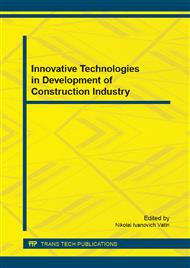[1]
ODM 218. 2. 031-2013 Metodicheskiye rekomendatsii po primeneniyu zoly-unosa i zoloshlakovykh smesey ot szhiganiya uglya na teplovykh elektrostantsiyakh v dorozhnom stroitelstve (2013) Rosavtodor, 63 p.
Google Scholar
[2]
Lazarev, Y., Sobko, G., Chakir, M. Research of processes of improving soil properties based on complex ash cement binder (2014) Applied Mechanics and Materials, 584-586, pp.1681-1686.
DOI: 10.4028/www.scientific.net/amm.584-586.1681
Google Scholar
[3]
Putilin, E.I., Tsvetkov, V.S. Obzomaya informatsiya otechestvennogo i zarubezhnogo opyta primeneniya otkhodov ot szhiganiya tverdogo topliva na TES, [Overview of domestic and foreign experience in use the wastes of burning the solid fuel on thermal power-stations], SoyuzdomNII, Moscow, 2003, 60 p.
Google Scholar
[4]
Vatin, N.I., Petrosov, D.V., Kalachev, A.I., Lahtinen, P. Primeneniye zol i zoloshlakov v stroitelstve [Use of ashes and ash-and-slag wastes in construction] (2011) Magazine of Civil Engineering, 4 (22), pp.16-21.
DOI: 10.5862/mce.22.2
Google Scholar
[5]
Dvorkin, L.I., Dvorkin, O.L. Stroitelnye materialy iz otkhodov promyshlennosti: uchebno-spravochnoe posobie, [Construction materials from industrial wastes: tutorial] (2007) Rostov-na-Donu: Feniks, 363 p.
Google Scholar
[6]
Rekomendatsii po primeneniyu v betonakh zoly, shlakov i zoloshlakovykh smesey teplovykh elektrostantsiy, [Guidelines on use in concretes the ash, slags and ash-and-slad mixtures from thermal power stations] (1986) Moscow: Stroyizdat, 80 p.
Google Scholar
[7]
Lahtinen, P. Fly ash mixtures as flexible structural materials for low-volume roads: Dissertation for the degree of Doctor of Science in Technology (2007) Helsinki, 102 p.
Google Scholar
[8]
Kaklauskas, A., Zavadskas, E.K., Kazokaitis, P., Bivainis, J., Galiniene, B., D'amato, M., Naimaviciene, J., Urbanaviciene, V., Vitas, A., Cerkauskas, J. Crisis management model and recommended system for construction and real estate (2013).
DOI: 10.1007/978-3-642-34300-1_32
Google Scholar
[9]
Brykov, A.S., Vasil'ev, A. S, Mokeev, M.V. Hydration of portland cement in the presence of aluminum-containing setting accelerators (2013) Russian Journal of Applied Chemistry, 86 (6), pp.793-801.
DOI: 10.1134/s1070427213060013
Google Scholar
[10]
Sprince, A., Fischer, G., Pakrastinsh, L., Korjakins, A. Crack propagation in concrete with silica particles (2014) Advanced Materials Research, 842, pp.470-476.
DOI: 10.4028/www.scientific.net/amr.842.470
Google Scholar
[11]
Stelea, L., Costescu, I. Ecologically sustainable asphalt mixtures in the road technique (2012) Journal of Environmental Protection and Ecology, 13 (4), pp.2325-2330.
Google Scholar
[12]
Marc, P., Costescu, I. Industrial wastes used in pavement layers (2013) Journal of Environmental Protection and Ecology, 14 (1), pp.187-195.
Google Scholar
[13]
Park, W.S., Kim, J.E., Eom, N.Y., Kim, S.W., Kim, D.G., Cho, M.S. Mechanical properties of high strength concrete using mineral admixtures (2013) Applied Mechanics and Materials, 372, pp.235-238.
DOI: 10.4028/www.scientific.net/amm.372.235
Google Scholar
[14]
Bichurin, M. Struktura i svoystva polimemykh kompozitsionnykh materialov, napolnennykh slantsevoy zoloy [Structure and properties of polymeric composite materials filled with shale ash] (1997) Thesis SGTU, Saratov, p.151.
Google Scholar
[15]
Lazarev, Y., Sobko, G. Rekonstruktsiya avtomobilnykh dorog [Reconstruction of the roads] (2013) SPbGASU, St. Peterburg, 93 p.
Google Scholar
[16]
Dubina, S.I., Sobko, G.I., Maksimov, A.T. Odezhda bez peska i shchebnya. Primeneniye innovatsionnykh tekhnologiy pri stroitelstve avtomobilnykh dorog iz ukreplennykh gruntov [Pavement without sand and gravel. Application of innovative technologies in the construction of roads from reinforced soil] (2008).
Google Scholar
[17]
Dvorkin, L.I., Dvorkin, O.L. Stroitelnyye materialy iz otkhodov promyshlennosti [Building materials from the industrial waste] (2007) Feniks, Rostov-na-Donu, 368 p.
Google Scholar
[18]
Chakir, M., Sukhareva, L., Molchanova, N. Use of complex ash cement binder for improvement of soil properties (2014).
Google Scholar
[19]
Usmanov, R., Mrdak, I., Vatin, N., Murgul, V. Reinforced soil beds on weak soils (2014) Applied Mechanics and Materials, 633-634, pp.932-935.
DOI: 10.4028/www.scientific.net/amm.633-634.932
Google Scholar
[20]
Lahtinen, P. Fly ash mixtures as flexible structural materials for low-volume roads: Dissertation for the degree of Doctor of Science in Technology (2011) Helsinki University of Technology, p.102.
Google Scholar
[21]
Mulder, E. A mixture of fly ashes as road base construction material (1996) Waste Management, 16(1–3), pp.15-20.
DOI: 10.1016/s0956-053x(96)00026-8
Google Scholar
[22]
Tuncan, A., Tuncan, M., Koyuncu, H. Use of petroleum-contaminated drilling wastes as sub-base material for road construction (2000) Waste Management and Research, 18(5), pp.489-505.
DOI: 10.1034/j.1399-3070.2000.00135.x
Google Scholar
[23]
Volzhenskiy, A., Ivanov, I., Vinogradov, B. Primeneniye zol i toplivnykh shlakov v proizvodstve stroitelnykh materialov [Use of ashes and fuel wastes in the manufacturing of building materials] (1984) Stroyizdat, p.254.
Google Scholar
[24]
Murgul, V. Features of energy efficient upgrade of historic buildings (illustrated with the example of Saint-Petersburg) (2014) Journal of Applied Engineering Science, 12 (1), pp.1-10.
DOI: 10.5937/jaes12-5609
Google Scholar


